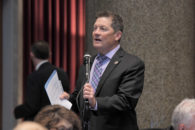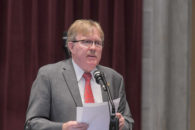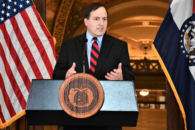The ballot language for a referendum petition “dishonestly misstates the content” of a sweeping anti-abortion bill, according to GOP megadonor David Humphreys.
The Joplin businessman released a statement Friday blasting Missouri’s chief election officer for how the referendum would appear on the ballot — should enough signatures be collected.

“Jay Ashcroft’s deceptively stated ‘exception’ for medical emergencies is no exception at all,” Humphreys said. “Physicians will have to risk their reputations and their livelihoods – and face possible imprisonment – for performing any post-eight-week emergency medical procedure that results in termination of a pregnancy. Women and girls could be deemed criminals without ever intending to abort their pregnancies.”
“The complete lack of exceptions to protect female victims of rape and incest is another flagrant example of Jay Ashcroft’s misstatements on his ballot summary of legislation that is deeply flawed and likely unconstitutional,” he said.
He has long been critical of the measure’s lack of exceptions for rape and incest. In June, he donated $1 million to the Committee to Protect the Rights of Victims of Rape & Incest, which was formed in support of a referendum to put the abortion ban to a vote. He also donated $25,000 to a political action committee associated with the lone Republican to vote against the bill.
Humphreys sought to put HB 126 to a vote of the people, filing two referendum petitions — both of which were rejected by Ashcroft.
The referendum which gained approval to circulate on Wednesday was filed on behalf of the ACLU of Missouri. A lengthy court battle took place for the petition to reach this step in the process.
All three petitions were originally rejected by Ashcroft “for failure to comply with the requirements of the Missouri Constitution.” The issue, he said, is the emergency clause attached to the bill. The emergency clause resulted in a portion of the bill going into effect immediately after Republican Gov. Mike Parson signed it. The provision requires both parents to be notified if a minor seeks an abortion.
The vast majority of the provisions — banning abortion at eight weeks, along with “nestled” components to include restrictions at 14, 18, and 20 weeks — will go into effect on Aug. 28.
According to the fiscal note attached to the ballot language, “state sources may decrease by at least $4.9 million annually” and “local governmental entities anticipate a significant negative impact.”
While Humphreys filed a legal challenge contesting Ashcroft’s rejection, he did not pursue the case following its dismissal in Cole County. The ACLU took the case to the appeals court, which ordered Ashcroft to approve the petition on form.
The secretary of state issued ballot language for the referendum on Wednesday, leaving opponents just two weeks to collect more than 100,000 signatures.
Robin Utz, treasurer of the No Bans On Choice Committee, said Ashcroft “dragged his feet” and left them with the “impossible task” of collecting signatures by Aug. 28 — when the law goes into effect.
Ashcroft has maintained his office has treated this referendum the same as others.
“It’s unfortunately pretty common in politics that when people make a mistake they want to blame someone else,” Ashcroft told The Missouri Times on Thursday. He noted the ACLU waited to file the petition until after the law’s emergency clause was already in place.
This is not the first time Missouri’s secretary of state has been challenged over ballot language. Robin Carnahan, a Democrat, had multiple summaries rewritten by courts, and in 2017, a judge rewrote Ashcroft’s summary of a right-to-work referendum — though an appeals court reversed the decision.
Just last week, Mary Anne Sedey filed a lawsuit in Cole County Friday alleging the “biased and inflammatory” summaries of petitions were “intentionally cherry-picked” and described “in as loaded and pejorative terms as possible.”

Alisha Shurr was a reporter for The Missouri Times and The Missouri Times Magazine. She joined The Missouri Times in January 2018 after working as a copy editor for her hometown newspaper in Southern Oregon. Alisha is a graduate of Kansas State University.



















